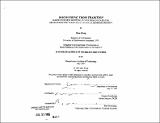Discovering from tradition : lessons for new shopping center designs in Beijing, drawn from the traditional Da Shi-la shopping district
Author(s)
Wang, Qian
DownloadFull printable version (19.14Mb)
Other Contributors
Massachusetts Institute of Technology. Dept. of Architecture.
Advisor
Dennish Frenchman.
Terms of use
Metadata
Show full item recordAbstract
Since the 1979 Open Door policy, there have been the tensions between the illusion of far reaching advancement and the reality that basic provisions are scarce. Reflected in modem shopping designs in Beijing, this phenomenon places constraints on designers who are forced to focus on financial returns, rather than civic or cultural benefits. A number of modem shopping centers have been designed with no regard for the precious urban and architectural characteristics of Beijing's shopping tradition. Thus, Beijing's unique cultural and social shopping experience is facing a slow but steady demise. After criticizing some of the aspects in current modem shopping center designs in Beijing, I will argue in this thesis that the solution to the discussed problems is to integrate traditional shopping culture continuity with modem retail requirements. I use the Beijing's Da Shi-La Traditional Shopping District as a primary case to comprehensively examine the urban and architectural essence of the Beijing merchandising tradition. Following the case analysis, I will recommend seven design principles which aim to guide the design of modem shopping centers in the city. These principles encompass the cultural environment, relation to traffic and access, mix of businesses, retail space for small to large businesses, architectural elements, public space, and individuality. The final part of the study includes a preliminary design proposal for Fang Zhuang New Shopping Center in Fang Zhuang, Beijing. The schematic design systematically illustrates an application of the seven design principles in an urban context.
Description
Thesis (M.S.)--Massachusetts Institute of Technology, Dept. of Architecture, 1995. Includes bibliographical references (leaves 117-118).
Date issued
1995Department
Massachusetts Institute of Technology. Department of ArchitecturePublisher
Massachusetts Institute of Technology
Keywords
Architecture.